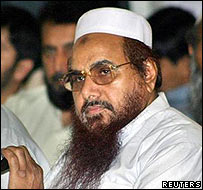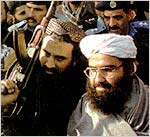|
|
|
Lashkar-e-Taiba leader Hafiz Saeed. |
Indian has demanded the Pakistani government turn over about 20 most wanted terrorists to demonstrate its seriousness about fighting terrorism in the wake of last week’s terror siege of Mumbai. At the top the list are Laskhar-e-Taiba leader Hafiz Saeed, Jaish-e-Mohammed leader Maulana Masood Azhar, and mafia and terror kingpin Dawood Ibrahim. The Long War Journal has obtained the names of several other senior terrorist leaders wanted by the Indian Government.
The demands were made during a meeting between Indian Foreign Minister Pranab Mukherjee and Pakistan’s High Commissioner to India Shahid Malik yesterday. The Indian foreign minister summoned Malik to the ministry and registered an official diplomatic protest with Pakistan.
“We have in our demarche asked for the arrest and handover of those persons who are settled in Pakistan and who are fugitive of Indian law,” Mukherjee told The Times of India, noting India “will await” a response from Pakistan.
Yesterday, a foreign ministry statement said the attacks were launched from “elements” within Pakistan, and that Pakistan’s High Commissioner to India was warned it must turn over the top terror leaders within his country.
“He [the High Commissioner] was informed that the recent terrorist attack on Mumbai was carried out by elements from Pakistan,” a foreign ministry statement read. “Government expects that strong action would be taken against those elements, whosoever they may be, responsible for this outrage.”
India’s most wanted
Topping the list of wanted terrorists is Hafiz Saeed, the founder and leader of the al Qaeda-linked Laskhar-e-Taiba, or Army of the Righteous. India has implicated Lashkar-e-Taiba as being behind the Mumbai terror attack. Saeed and the Laskhar-e-Taiba have strong links with elements within Pakistan’s military and the Inter-Service Intelligence agency, or ISI.
Osama bin Laden and his mentor Abdullah Azzam encouraged Saeed to form Lashkar-e-Taiba in the late 1980s, and helped fund the establishment of the terror outfit. Lashkar-e-Taiba, like al Qaeda, practices the Wahabi strain of Islam, and receives funding from Saudis and other wealthy individuals throughout the Middle East. Saeed has been arrested several times by Pakistani security forces after attacks in India, but has been quietly released each time.
Lashkar-e-Taiba has an extensive network in Southern and Southeast Asia, where it seeks to establish a Muslim caliphate. The group essential runs a state within a state of Pakistan, much like Hezbollah does in Lebanon. Its sprawling Murdike complex, just northwest of Lahore in Punjab province, is a town of its own. Lashkar-e-Taiba runs numerous hospitals, clinics, schools, mosques, and other services throughout Pakistan and Pakistan-occupied Kashmir.
The Pakistani government banned Lashkar-e-Taiba in January 2002, but this did little to shut down its operations. Saeed renamed Lashkar-e-Taiba the Jamaat-ud-Dawa and continued operations throughout Pakistan. It was instrumental in providing aid to the victims of the 2005 earthquakes in Kashmir.
|
|
|
Maulana Masood Azhar, the leader of the Jaish-e-Mohammed (right). |
Next is Maulana Masood Azhar, the leader of the Jaish-e-Mohammed, or Army of the Prophet Mohammed. Azhar trained at the same religious seminary as Afghanistan Taliban leader Mullah Omar. Azhar was released from an India jail in exchange for hostages held in an Indian Airlines flight hijacking in December 1999. He established the Jaish-e-Mohammed the next year as an offshoot of the Harkat-u-Ansar, one of many terror groups created to fight the Indians in India-occupied Kashmir.
The Jaish-e-Mohammed was implicated along with the Lashkar-e-Taiba as being behind the Dec. 13, 2001 attack on the Indian Parliament building in New Delhi. In October 2001, the US added Jaish-e-Mohammed a foreign terrorist organization.
|
|
|
Mafia and terror kingpin Dawood Ibrahim. |
Dawood Ibrahim is perhaps Indian’s most wanted man. Ibrahim runs an extensive criminal network throughout South Asia. Al Qaeda and other Pakistani and Bangladeshi terror groups have allied with Ibrahim to leverage his network of weapons smuggling and other services. The US government branded Ibrahim as a Specially Designated Global Terrorist in 2003.
Ibrahim has been implicated in the 1993 Mumbai bombings and is known to receive backing by Pakistan’s Inter-Service Intelligence agency. Indian intelligence believes Ibrahim is based out of Karachi.
Other wanted terrorists leaders
The Indian government has not publicly released the names of the other wanted terrorists, but an intelligence official who wishes to remain anonymous due to the sensitivity of the topic has divulged several of the names on the list to The Long War Journal. The list includes senior operatives in the Lashkar-e-Taiba, Jaish-e-Mohammed, Hizb-ul-Mujahideen, and the Harakat ul-Jihad-I-Islami.
Lashkar-e-Taiba:
Zia-Ur-Rehman Lakhvi: Also know as Chachaji, Rehman serves as the military commander of the Lashkar-e-Taiba. The satellite phone found the hijacked Indian fishing boat used in the Mumbai attack had calls to Rehman.
Azam Cheema: The commander of Lashkar-e-Taiba’s Indian operations branch, known as the Dasta Mohammad bin Qasim.
Yusuf Muzammil: A senior operations commander of Lashkar-e-Taiba. He was in contact with a Bangladeshi named Yahya, who helped get the Mumbai terrorists fake IDs and SIM cards.
Abdul Karim: Also known as Tunda, Karim is the top field operative in the Lashkar-e-Taiba’s Indian operations branch.
Talha Saeed: The son of Hafiz Saeed, Talha manages Lashkar-e-Taiba’s operations at the main camp in Muzaffarabad in Pakistan-occupied Kashmir.
Jaish-e-Mohammed:
Shah Nawaz Khan: Also known as Sajjid Jihadi, Khan is the top military commander for Jaish-e-Mohammed in Kashmir.
Mohammed Ibrahim Athar Alvi: The brother of Masood Azhar, Alvi took part in the 1999 high jacking of the Indian Air flight in 1999.
Hizb-ul-Mujahideen
Mohammed Yusuf Shah: Also known as Syed Salahuddin, Shah is the head of the Hizb-ul-Mujahideen, a radical terrorist group that operates in Kashmir.
Ghazi Nasiruddin: The commander of military operations for Hizb-ul-Mujahideen.
Harakat ul-Jihad-I-Islami
Ilyas Kashmiri: The operations chief for Harakat ul-Jihad-I-Islami in Kashmir.











11 Comments
How feasible is it for Pakistan to actually arrest some of these people? I mean the Indians could have included OBL on the list while they were at it. You point out that the Pakistanis placed Saeed under house arrest only to release him later. I suspect this has less to do with ISI malfeasance than it does with the desire of the Pakistani authorities to look competent. They most likely struck a deal with Saeed so they could save face and not look like a bunch of jackasses. I doubt they would have the capability to actually arrest and deport him.
So the question is, is this a good faith move on India’s part or a precursor for military action? Don’t get me wrong, I think military action is long overdue. I’m just asking the question…
Considering the fact that elements of the ISI are pro-taliban and top military people were recently quoted as believing that certain terrorists were “patriots”, I highly doubt that India will get their top 20. Maybe Pak throws in a couple of the lowest level guys on the top 20 to make it look like they’r emaking a good faith effort (i.e. try to appease India), but everyone knows that Pak won’t hand over the top guys.
So where does this go? I personally hope that India sticks to its guns and basically says that not handing the 20 guys over is a sign of complicity, and therefore an act of war (based on what happened).
Something big needs to happen in Pak, and a war with India would be great cover for our guys to go into pak on the other side and hunt and kill our targets. Heck, if India was to wipe Pak off the face of the earth, would anyone be the worse for it?
We can really turn this to our advantage, as long as India pushes the issue hard.
Andrew
Frank said:
“We are in a war….there are no rules about killing your enemy.”
Frank, some of our politicians are wringing their hands about our hospitality level at Gitmo for the worst of the worst of our enemies. Not everyone seems to be on the same page about the dangers we’re facing.
Andrew
I agree 100% with you Frank. These guys would cut the heads off of our children, yet we’re worried about their accomodations, and of course, whether or not we’re granting them their civil liberties.
I would liken this to a game of chess. There are rules to the game (i.e. how certain pieces can move on the board). If you play against someone who moves their pieces as they like versus how the rules say they can move, and you stick to the rules, you will certainly lose.
The big question here is do we want to lose (our way of life and even our lives) playing by the rules or do we want to win.
I would rather we win and therefore protect all that we hold dear by playing the game more like our enemy does than by having a WMD go off on our soil, with our only solace being that we treated these animals properly.
The fact is, they don’t deserve to be treated properly. They spray acid on the faces of little girls and we want to ensure that they have prayer mats at Gitmo.
In the end, if we lose, it won’t be because we couldn’t win. It will be because we didn’t have the will to win. Will our leaders wisen up in time? Stay tuned…
A clever move by Inda. Obviously Pak can’t turn over more than a few of their “miscreants.” Who wants to bet they’ll perform verbal gymnastics to explain why the task is impossible. I happened to watch the new Pak prime minister give a speech in Washington a few months ago. His presentation was filled with platitudes and transparent duplicity.
The opportunity is here in front of us. The U.S. should side proudly with Inda; and Ms. Rice could add all the AQ vermin in western Pakistan to the list as well.
Pakistan has proven itself impotent and complicit, over and over, for many years now. I feel sorry for the decent Pakistanis who have silently stood by while this cancer spreads through their body politic.
As far as the concerns we hear about Pakistan moving its military to the LOC to protect itself from Indian attack, what’s to stop a major offenseive in the northwest? NATO and India can meet in Islamabad to negotiate terms of surrender of a failed state. Many Pakistanis may welcome the security of victory over the scourge of AQ and Taliban.
Where is Murdike (Lashkar-e-Taiba’s “sprawling Murdike complex is a town of its own”) and how accessible to Indian operations or air raid?
Google maps doesn’t know Murdike.
I found my own answer in Bill’s Weekly Standard blog: “the Lashkar-e-Taiba Muridke complex near Lahore and the forward headquarters in Muzaffarabad in Pakistan-occupied Kashmir. ”
Fine for India to bomb, and OK for a ‘joint ooperation’ raid if the Pakistani military co-operate. If they dont cooperate, then Pakistan is guilty of sheltering the terrorists in the same way that the Taliban in Afghanistan were in 2001.
davidp,
Muridke is northwest of Lahore in Punjab province, you can get the lat/long here:
http://www.fallingrain.com/world/PK/4/Muridke2.html
I updated to entry to be a little more specific.
You know, while I also think that military action is overdue if you see this here through Indian eyes – but doesn’t a war between India and Pakistan right now, possibly even including a nuclear exchange, have some rather negative consequences for the Western troups in Afghanistan and their supply lines through Pakistan? You know, I wouldn’t count on functioning supply lines through Pakistan during a war between Pakistan and India…
As long as the West doesn’t find a different route for supplying troups in Afghanistan India starting a war with Pakistan is simply not in the interest of the west. Or am I missing something?
Vito, we’re currently closing up a deal with Uzbekistan to truck in supplies through their territory. I dunno how much tonnage it can handle, or if it will be a replacement for the lines through the Kyber, but ’tis better than nothin’.
Vito: You’re not missing anything. It’s a problem, an epic problem, waiting to happen.
Gaige: Not a suitable replacement, for a bunch of reasons. Not the least of which is it (the Uzbek supply line) indirectly belongs to Tsar Putin and it can be closed at a whim.
LEAST
WORST
OF,
R